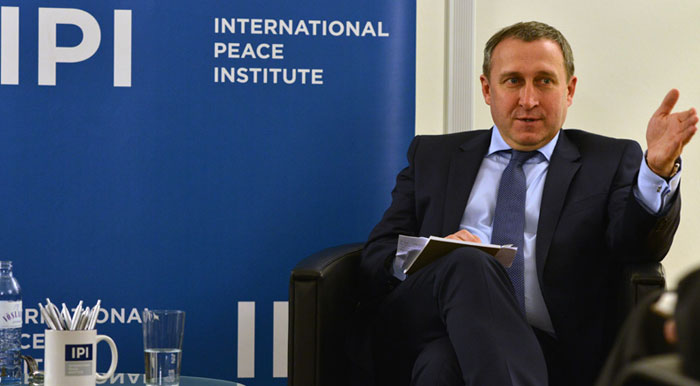
“We are open to dialogue,” said Andriy Deshchytsia, acting Foreign Minister of Ukraine, at IPI in Vienna on March 20th. However, he noted, at this time, there is no communication between him and his Russian counterpart. “We need to talk,” he said.
The foreign minister explained thus far unsuccessful attempts to form a contact group. Possible constellations include one advocated by US Secretary of State John Kerry made up of the signatories of the 1994 Budapest Declaration, namely the United States, the United Kingdom, the Russian Federation, and Ukraine. He noted that there is a lot of talk about Ukraine, but not always with Ukraine. “Any decision affecting the future of Ukraine must involve Ukraine,” stressed the minister, “otherwise, I will resign.”
He emphasized the importance of deploying an international monitoring mission to Ukraine. However, the stumbling block remains the geographic scope of the mission, specifically whether or not it will have access to Crimea.
Deshchytsia expressed concern at the growing number of Russian troops in the peninsula; the rising inflow of “political tourists” and “provocateurs” from Russia; unclear political signals from some members of the Commonwealth of Independent States; as well as the potential for Russia to use Transdniestria as a staging area for stirring up trouble around Odessa. He even hypothesized about a possible dangerous link-up between the Russian controlled break-away regions of Transdniestria, Crimea, and Abkhazia. He said “Russia is isolating itself” by its behavior.
Deshchytsia, speaking at IPI just hours after briefing a special meeting of the Permanent Council of the Organization for Security and Cooperation in Europe (OSCE), said that “we are witnessing the most flagrant violation of international law in the OSCE region since the Second World War.” He warned that the current crisis in and around Ukraine is a “stress test for the international community.” Furthermore, he said that handling of this crisis would “make or break” the OSCE.
He recalled how, just last year, under Ukraine’s Chairmanship of the OSCE, he had been the Special Representative on Conflicts, mediating crises in Nagorno-Karabakh, South Ossetia, and Transdniestria. “I could never have imagined that, just a few months later, I would be foreign minister, dealing with a conflict in my own country,” he said.
The foreign minister described Ukraine’s “euro-revolution” and how his country intends to move closer to the European Union.
He acknowledged some instability in eastern Ukraine. When asked about the possibility of federalization, he said that the needs of the country’s different regions could be accommodated by a nation-wide policy of decentralization.
The meeting, chaired by Walter Kemp, IPI Senior Director for Europe and Central Asia, was attended by the Secretary-General of the OSCE Lamberto Zannier; the Chairman of the OSCE Permanent Council, Thomas Greminger of Switzerland; more than a dozen ambassadors, members of the press, as well as experts from Vienna-based think tanks.
After the meeting, Foreign Minister Deshchytsia flew to Brussels for the signing of the political chapter of the EU Association Agreement.
Related News Coverage:
In English:
Ukraine crisis: OSCE unarmed on the front line (BBC News Europe, March 27, 2014)
In German:
Tiroler Tageszeitung, March 20, 2014







